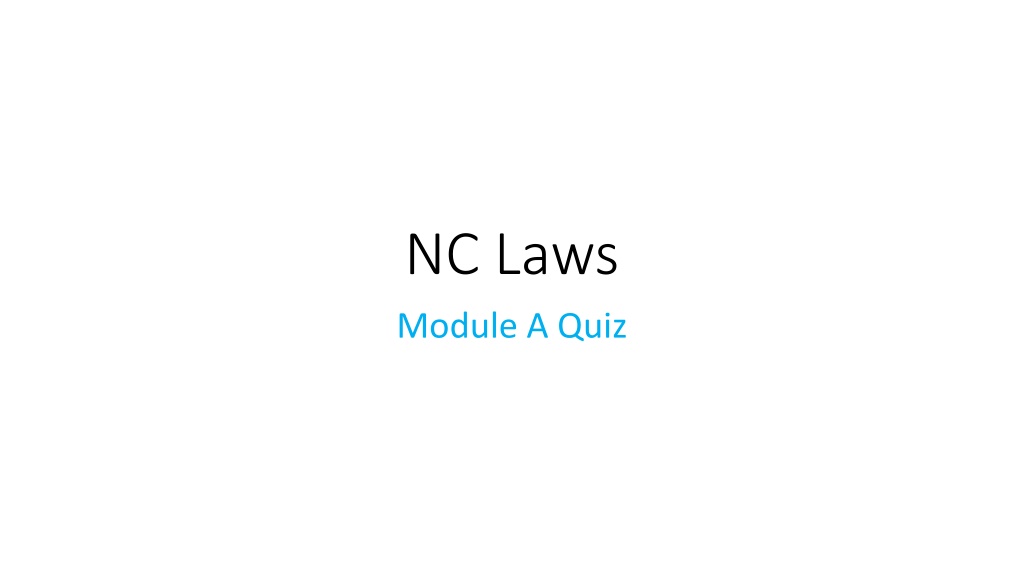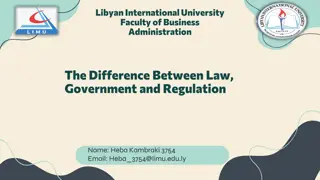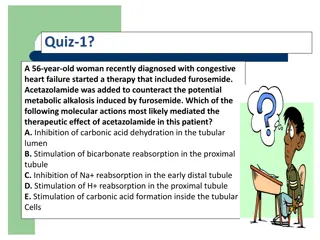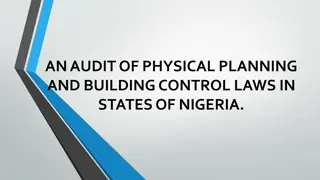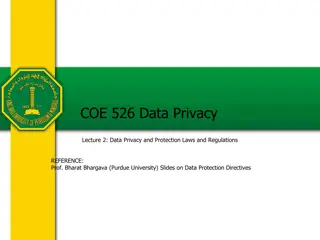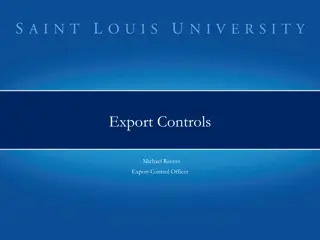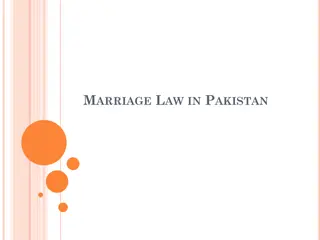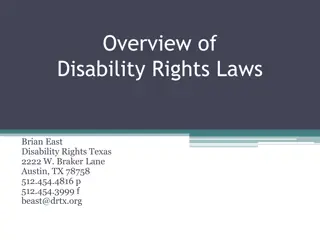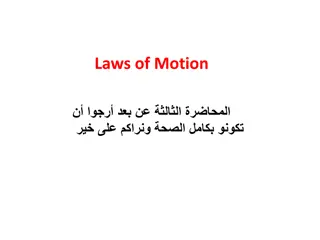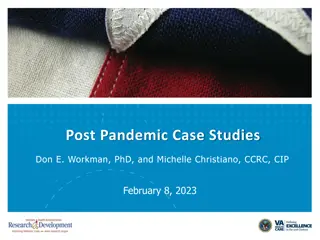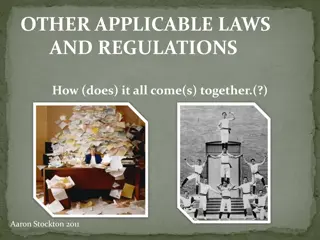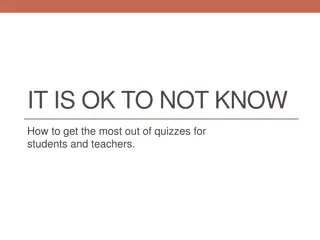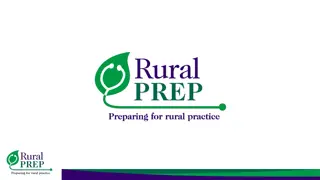Healthcare Laws and Regulations Quizzes
This content provides quizzes related to healthcare laws, regulations, and best practices. Topics include reporting communicable diseases, control measures for occupational exposure, handling dermatitis in healthcare settings, definitions of healthcare organizations, and OSHA requirements for Hepatitis B vaccinations. Check your knowledge and understanding of key healthcare compliance issues with these interactive quizzes.
Download Presentation

Please find below an Image/Link to download the presentation.
The content on the website is provided AS IS for your information and personal use only. It may not be sold, licensed, or shared on other websites without obtaining consent from the author. Download presentation by click this link. If you encounter any issues during the download, it is possible that the publisher has removed the file from their server.
E N D
Presentation Transcript
NC Laws Module A Quiz
True or False: NC General Statue requires a physician or other licensed medical professional to report communicable diseases to the local health department in which the patient resides. True False
Control measures for occupational exposure to HIV, HBV and/or HCV include which of the following? A. Determine the risk of exposure B. Follow up on the source of exposure C. Maintain confidentiality D. All of the above
This morning before clinic starts, a direct care healthcare worker comes in with weeping dermatitis on their left hand. Which statement below is correct? A. No restrictions are necessary as long as they use hand hygiene B. Staff must wear gloves all day when performing patient care C. Staff should have no direct patient care activities and should not handle patient care equipment D. Staff should be reassigned to clean soiled equipment
Which of the following are included in the definition of healthcare organization under the .0206 rule? A. hospitals, urgent care centers, schools B. hospitals, physician practices C. hospitals, urgent care centers, physician practices D. hospitals, urgent care centers, physician practices, schools
Which of the following statements pertaining to the .0206 rule is correct? A. Only the physician can be responsible for infection control and they must take the course B. If the trained, designated staff member leaves the healthcare facility someone else must be designated to take the course C. Ambulatory surgical centers are NOT included in the .0206 Rule D. Rule .0206 is a Federal Law and must be followed.
OSHA Module B Quiz
A new employee has received the first shot in the Hepatitis B series but does not wish to receive any additional shots. The employee must: A. Complete the series because it is a OSHA rule B. C. D. Nothing else is required Sign a declination form Quit their job
True or False: Employees may wear PPE outside of the work area (i.e., area where work involving occupational exposure occurs or where the contamination of surfaces may have occurred). True False
Which of the following is required to have a bio-hazard label and/or be red in color? A. outside laboratory B. sharps container, specimen refrigerator C. medication refrigerator D. sharps container, specimen refrigerator, specimens being sent to an outside laboratory sharps container, medication refrigerator, specimens being sent to an
True or False: Exposure control plans must be reviewed and updated every six (6) months True False
Splash guards, mounted one the side of contaminated sinks is an example of: A. Administrative control B. C. D. Work Practice Control Personal Protective equipment Engineering Control
Epidemiology and Risk of Infection Module C Quiz
True or False: Standard Precautions are the minimum infection prevention practice that applies to all patient care, regardless of suspected or confirmed infection status of the patient. True False
In healthcare settings, most infections are spread by which of the following: A. Hands of healthcare workers B. C. D. Staff coming to work sick Not requiring employees to take the flu shot Dirty patient care equipment
Your provider reports that the facility has an outbreak of influenza. Which of the following is the most important thing to do when conducting the investigation. A. Let all of the staff know what is going on B. C. D. Identify the person responsible for the outbreak Verify the fact that an outbreak is occurring Make all of the staff take the flu shot
True or False: Non-intact skin can serve as both a portal of entry and a portal of exit for an infectious organism. True False
Which of the following statements is true? A. minute B. season C. D. unless hands are visibly soiled. Hands should always be washed with soap and water for at least one Respiratory hygiene and cough etiquette protocols only apply during flu The most common place for harmful germs to live is on animals Use of an alcohol based hand rub is recommended by CDC for hand hygiene
Outbreaks and Safe Injection Practices Module D Quiz
Which of the following items can be used for multiple patients? A. Insulin pen B. C. D. Small bag of saline Single dose vials Multi-dose vials
Which of the following is TRUE about single dose vials? A. It is okay to use a single dose medication for more than one patient B. vial C. time and remaining contents discarded. D. For cost containment, it is okay to purchase vials containing quantities in excess of those needed for a single patient Prefilled syringes can be drawn up for multiple patients from a single dose Single-dose vials must be dedicated to a single patient, accessed only one
Is it acceptable to visually inspect syringes to determine whether they are contaminated or can be used again? A. Yes B. No C. Maybe
Best practices to ensure safe injection practices include: A. Conduct quality assurance assessments B. C. D. E. Develop written infection control policies Designate someone to provide oversight Provide training All of the above
All of the following statements are FALSE, EXCEPT: A. same syringe B. again without cleaning it C. Hepatitis B and C outbreaks have been caused by unsafe injection practices D. It is OK to re-use a multi-dose vial when it is brought into the immediate patient care area If you change the needle between each patient, it is OK to keep using the If you cannot see blood contamination on a glucometer, it is OK to use it
Principles and Practices of Asepsis Module E Quiz
Which of the following statements is FALSE: A. activities B. procedures C. not touching each other D. Hand hygiene is a major component of asepsis Medical asepsis or clean technique should be used for all patient care Surgical asepsis or surgical technique should be used for all sterile Clean, dirty and sterile supplies can be stored together as long as they are
True or False: Alcohol based hand rubs are the preferred method of hand hygiene. True False
True or False: The term hand hygiene includes all of the following: handwashing with soap and water, antiseptic handwash, antiseptic hand rub, surgical antisepsis. True False
What are the components of asepsis? A. Hand hygiene B. C. D. E. Health care personnel PPE Separation of clean, dirty, and sterile items All of the above
A successful Hand Hygiene (HH) Program includes all of the following EXCEPT? A. Employer provides compatible lotions for staff B. C. D. Management selects HH products based on cost No artificial nails for staff providing direct clinical care Monitoring HH compliance with audits and staff feedback
Principles of Disinfection and Sterilization Module F Quiz
Which of these microorganisms is the MOST resistant to disinfection? A. Spores B. C. D. E. Fungi Viruses Bacteria Mycobacterium
High-level disinfection should be used to process which types of devices? A. Critical B. C. Semi-critical Non-critical
Sterilizer monitoring using a biological indicator (BI) should be performed at least how often? A. Never B. C. D. Weekly Daily Monthly
What 3 parameters in sterilization require documentation and ensure sterility? A. Time, temperature, pressure Chemical, physical, heat sensitive ink B. C. D. Physical, biological, spores Physical, chemical, biological Chemical, physical, heat sensitive ink
Patient care and sterile items must be stored to prevent contamination. Which statement is correct? A. Items should be stored all the way to the ceiling B. C. D. Open rack storage should have a solid, bottom shelf Patient care items can be stored on the floor Items can be stored under sinks as long as staff check daily
Application of Cleaning, Disinfection, and Sterilization Principles to Patient Care Equipment Module G Quiz
Which of the following are appropriate uses of 70% - 90% ethyl or isopropyl alcohol as a disinfectant? A. Blood spill, Glucometers, Septum of medication vial B. C. D. Septum of medication vial, Slit lamp Glucometer, slit lamp Glucometer only
True or False: Medication can be stored in the same refrigerator as lab specimens and/or food. True False
Which of the following statements regarding vaginal specula re- processing is correct? A. Scrub with dish detergent and rinse with hot water B. C. D. Use a low-level disinfectant Let speculums dry completely before manually cleaning Steam sterilization or soak in a high-level disinfectant
Instruments with lumens (channels) requiring High Level Disinfection (HLD) MUST have the lumen flushed with the HLD per the manufacturer s instructions for use (IFU). True False
Which statement is TRUE regarding medication safety? A. Prepare injections less than 3 feet from sink B. C. D. Only monitor temperatures when clinic is open Prepare in a clean, dedicated area Clean med prep area weekly
